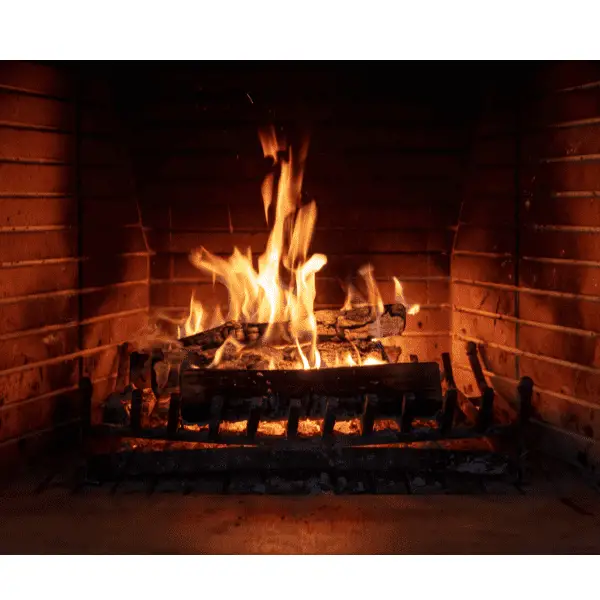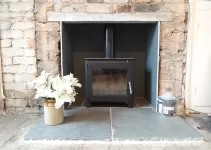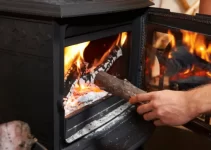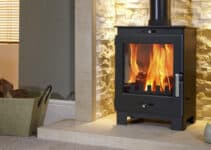Having a fire in your home is a great way to add atmosphere and reduce your reliance on a gas boiler. If you’re looking to add a solid fuel fire to your home, you might be wondering, log burner vs open fire: which is better?
In almost all criteria in which you could compare a log burner and open fire, a log burner is the better option. It’s more fuel efficient, meaning it costs less to run, and it’s generally much safer.
Perhaps the only reason to select an open fire is that it’s cheaper to set up.
In this article, we’ll go into more detail about the differences between a log burner and an open fire to help you decide which is best for your home.
Are Log Burners Better than Open Fires?
Log burners are better than open fires if your main concern is cost-effectiveness. Of course, efficiency is important, too, but this comes under the main consideration of cost.
For example, a log burner can be up to 80% efficient, meaning it turns as much as 80% of its fuel into heat dissipated into the room. On the other hand, open fires are only around 30% efficient at best.
This is because of airflow around the fire. In a log burner, airflow is controlled – both into the stove and up the chimney.
Controlling airflow means you can get the wood to burn at the most efficient rate, creating the most heat and burning for longer.
However, with an open fire, you have no control over the airflow. Aside from making the fuel burn faster, it means air is drawn up the chimney at a faster rate, which sucks a lot of the heat out too.
Another benefit of log burners is that you theoretically have more options for fuel. You can adapt a standard log burner to burn wood pellets, which are basically made from sawdust.
It’s not expensive to adapt your stove to take wood pellets, and they’re a far more efficient fuel source than standard logs.
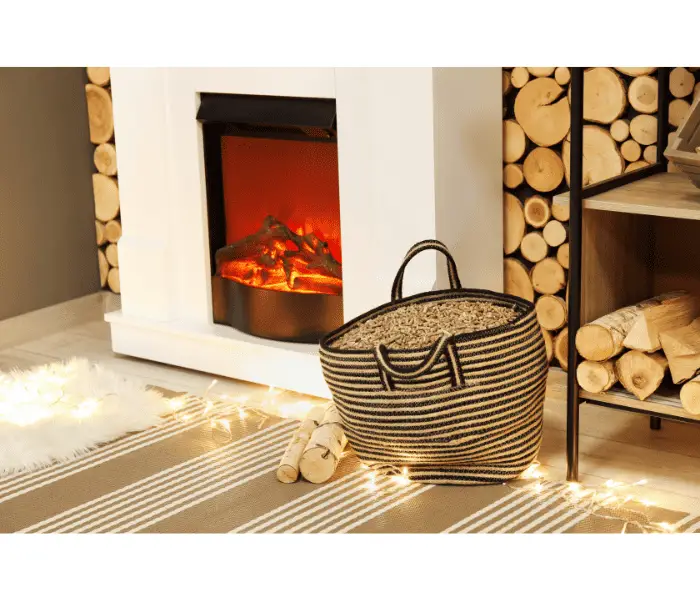
Controlling Heat Radiation
Similarly, we need to consider the rates of heat radiation into the room. This is what warms the room: heat radiates through the air at a set rate and uses convection currents to travel around a space.
With an open fire, the heat can only radiate from the fire as it burns. It means more heat comes off the fire at certain times rather than at a controlled rate.
Log burners, however, are designed to control the rate at which heat radiates from the fire. This is why they’re made of materials like cast iron and steel: they’re both great for transferring heat energy.
However, they take a long time to heat up and hold heat for longer, meaning they’ll continue to warm the room even after the fire has gone out.
Start-up Costs of Log Burners and Open Fires
The main benefit open fires have over log burners is that they’re cheaper to set up. Generally, to start an open fire, you basically need fuel and a grate to sit it in.
However, the grate isn’t even necessary – your fire could just sit on the hearth if you want it to.
In theory, an open fire could be free to run if you’re able to source your wood from the right place. But even if you don’t need to buy it, it’ll still be far cheaper than the cost of buying a log burner.
On the other hand, if you’ve ever looked to buy a log burner, you’ll know how expensive they can be. Even a budget model costs a few hundred pounds, which is mainly due to the materials and construction that go into making them.
But if we return to the efficiency statistics above, it’s fair to say that at some point, you’ll recoup your costs.
Granted, it might take a while if you’re not paying much for fuel, but you’ll quickly see how fast you can get through a stack of logs with an open fire.
Looks of a Log Burner vs Open Fire
Another area where open fires arguably win over log burners is in looks. An open, crackling fire is much cosier than a log burner. The sound and sight of a lit fire are very comforting, and can make your room feel far more inviting.
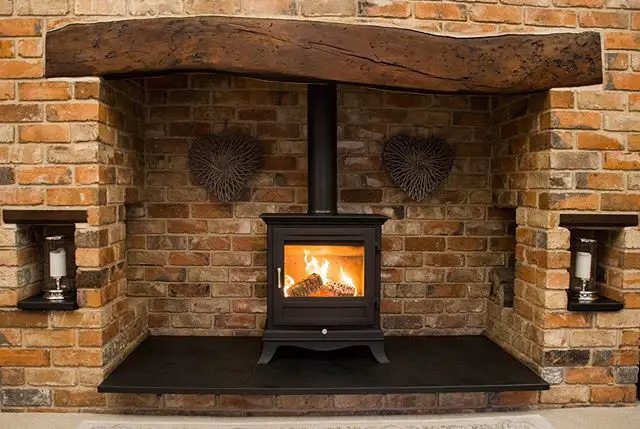
However, there aren’t many situations where looks should win over efficiency. While you might not get the exact same level of crackling fire from a log burner, the little window at the front allows you to still see the fire.
Once you get used to this, a log burner can be just as cosy as an open fire.
The Eco-Friendliness of Your Home – Open Fire or Wood Burner
Aside from looks, it’s fair to assume you’re installing a solid fuel fire to reduce your reliance on a gas-powered boiler.
There’s some debate over whether this is a more eco-friendly option, but the general consensus is that log burners are better because wood is a renewable source of biomass.
But another angle to consider is how the fireplace itself impacts your home’s energy efficiency rating. An open chimney (such as with an open fire) can basically equate to leaving a window open all the time. After all, it’s a literal open hole in your otherwise sealed home.
On the other hand, a log burner has an airtight seal between the unit and the flue that goes up the chimney. As such, it helps to block off what could be quite a major draft if left open.
Maintenance of a Log Burner or Open Fire
Both log burners and open fires need to be maintained at least once a year. The absolute minimum is having your chimney swept.
In fact, there’s not much more you could do with an open fire, making them the lower-maintenance option.
A log burner, however, will typically need an annual service. This’ll check seals and joins to make sure everything is working properly, and is also a good opportunity to clean your stove.
Log burners need regular emptying, too, as they have an ash drawer beneath the fire can create dust. An open fire will need the ash removed, but this is as simple as sweeping it off the hearth.
There’s less to clean in an open fire, although you’ll probably still need to remove ash just as often.
It’s fair to say there isn’t a clear winner from the maintenance angle. Log burners perhaps take more maintenance because they need servicing.
But considering this is something you’ll need to pay someone to do, it’s arguably no more work from your end.
Are Log Burners Safer than Open Fires?
The final consideration when weighing up log burners and open fires is safety. Unsurprisingly, log burners are safer than open fires.
Having a big metal box around the burning wood prevents embers from flying into the room, and drastically reduces the amount that goes up the chimney.
While it’s generally expected that you don’t have any combustible items near either an open fire or log burner, this doesn’t need to be as strictly enforced with a log burner.
The only time you might have a stray spark jumping into the room is when you open the door, but this is fairly unlikely.
If you do want an open fire, it’ll be worth installing a metal fire guard. While it won’t stop all embers and sparks from jumping into the room, it’ll stop bigger coals from landing on the floor.
Obviously, you should never leave an open fire unattended, either, just in case anything happens.
Air Cleanliness: Open Fire or Log Burner
It probably comes as no surprise that burning wood releases small particles into the air. Much like smoking cigarettes, these particles can be harmful to your health if you’re exposed to them for too long. While some might argue that any exposure is bad, prolonged exposure is always going to be worse.
A log burner will always be a better option from this angle because it contains the fire. Sure, log burners aren’t airtight (they physically can’t be), but they release far fewer particles into the air than open fires.
If you want a wood-burning stove in your home, a contained log burner is the “healthiest” option.
You can easily control the levels of pollutants in the air, though. Only ever use wood with a moisture content of 20% or less (the lower the better), and buy the most efficient log burner you can find.
These factors can reduce pollutants by as much as 90% compared to using an open fire.
Open Fire vs Log Burner: Which is Better?
The bottom line is that, based on pretty much any metric you can think of, log burners are better than open fires.
Are wood burners worse than open fires?
Wood burners are way more efficient and cost-effective, and much safer for both your health and your home. Provided you can deal with not having an open crackling fire in your room, a wood burner will always be a better option.
